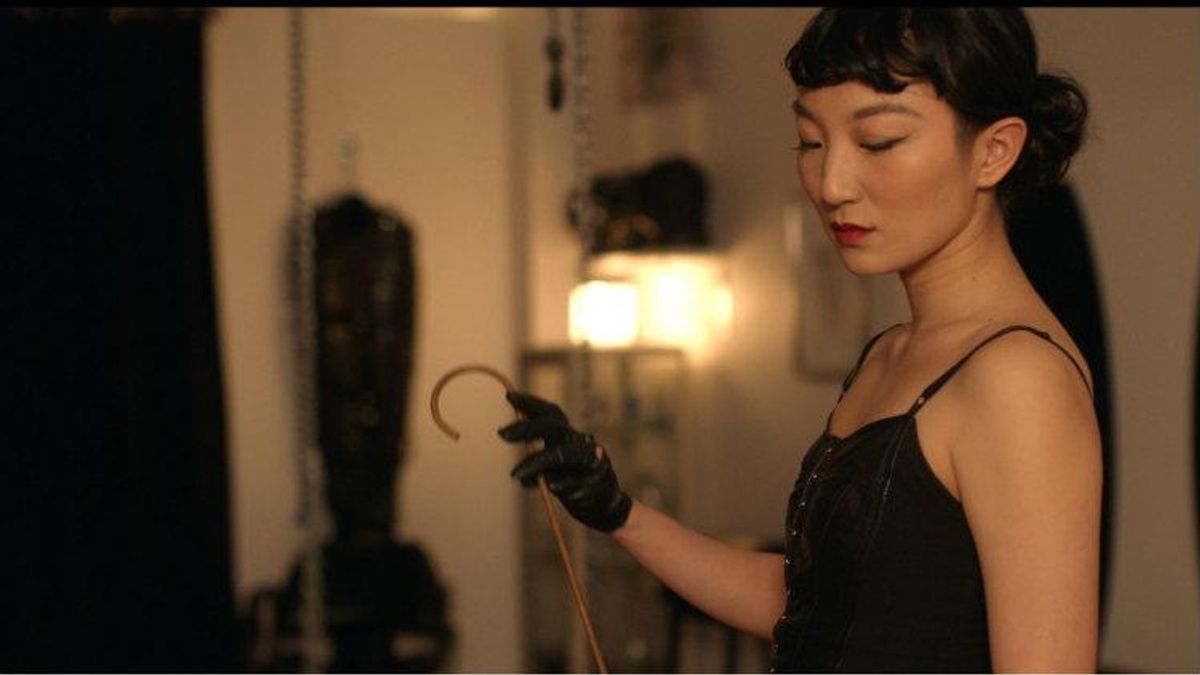The acronym BDSM is powerful in its ability to convey vivid thoughts and imagery. The practice, being as intimate and sensory-driven as it is, can bring to mind visions of handcuffs, whips, leather, and even the cheesy dialogue of a Fifty Shades book for those who are conservatively exposed to the culture.
In Mercy Mistress, a new semi-autobiographical web series based on the real-life experiences of Yin Q, the world of BDSM is explored with an educational approach in an attempt to demystify the intricacies of the practice, and expunge the social stigma around it. The series follows Mistress Yin (Poppy Liu) and her life as a professional dominatrix in New York City, with each episode centering on a different client and their particular kink. At play is the larger story about Yin's own sexuality and her emancipation from cyclical abuse and a path toward self-destruction.
Out reached out to Q ahead of the series' New York premiere to talk about the aspects of BDSM present in Mercy Mistress and, most importantly, to become educated.

OUT: What's behind your desire to erode the social stigma surrounding the culture of BDSM and its practices?
Yin Q: When any aspect of sexuality is laden with social shame, it's hurtful to the individuals who have those desires within them, as well as those around them. As we witness with LGBTQIA culture, once our lifestyles are more publicly accepted, there comes eventual relief of both the mental and physical health stresses on our communities. Shame drives our actions to a degraded and often unsafe modality with STD transference, susceptibility to violence, and exploitation resulting in that spiral.
If we embrace the darker sides of sexual desires, we can let light into those areas and practice in safe, consensual, and meaningful ways. With culture change comes education of practical skills as well as the most basic understanding of respect and continuous consent.
What are you hoping this series teaches people who come in knowing nothing about BDSM culture?
Compassion.
The key elements that the BDSM lifestyle and leather community stress are: Safety - both emotional and physical - respect, trust, and consent. And when we speak of consent it's not just about saying "yes" to exploring all the activities that fall under Kink, but [about] communicating continuous and enthusiastic consent.
I also want to reveal the practice of transformational and transcendent BDSM rituals. Much like other holistic techniques of healing - like acupuncture and yoga - BDSM ritual work is a way for the participants to activate trauma recovery, psychonautic explorations, and/or cathartic release.

The crew for the project was comprised of mostly women and gender-nonconforming people. Why was that?
This story, being autobiographical, is centered on a queer Asian-American femme's story about gender roles, sexuality, power, and commerce. These are very complicated and raw issues that need careful and authentic representation. The female gaze was extremely important to the depiction of what legit sex work can be and how trauma can be transformed.
I'm a non-binary person and consider myself GenderQueer. I'm not personally militant about how others may identify or mis-identify me, but I know that my relationship to gender is an evolution.
In collaboration with my co-executive producers, also queer femmes, Poppy Liu (lead) and Amanda Madden (director/editor), our hiring process was motivated by the ideal that to decolonize storytelling and appropriation of our identities, it matters how the story is made and by whom*.
To have marginalized identities on both sides of the camera creates a community that is a whole, rather than replicating the hierarchy of traditional media making.
*Language adopted from the production company Collective Sex, founded by Liu and Madden.
Do you think people are more open to learning about BDSM culture today than they have been in the past?
Yes.
I think that in some ways the Fifty Shades phenomenon opened the door to the discussion about Kink in a very public way, thought it was also damaging due to its portrayal of the BDSM lifestyle as abusive and coercive. While pop culture may flaunt the iconography of BDSM culture, adopting language and fashion, it doesn't delve deep enough into the conversation of how to practice consensual and self-affirming kink.
The internet has provided a way for marginalized and once-invisible communities to find one another and share conversations and create gatherings. You can find kink education classes at almost every adult pleasure store in the cities. More couples are realizing that it's not wrong to explore kinky sex and that they don't need to don leather and chains to do so.
Mercy Mistress made its New York City debut today. Find more screening info, here.
This interview has been edited and condensed.





















































































